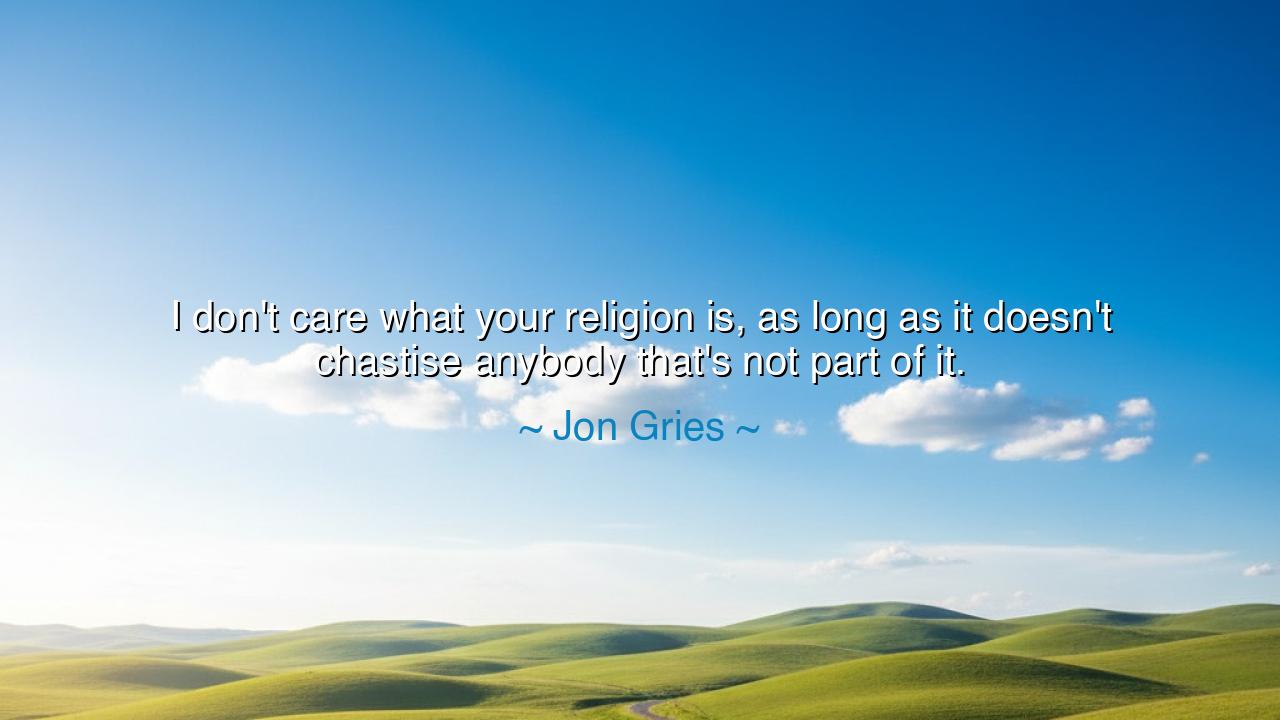
I don't care what your religion is, as long as it doesn't
I don't care what your religion is, as long as it doesn't chastise anybody that's not part of it.






When the actor and philosopher of quiet conviction, Jon Gries, said, “I don’t care what your religion is, as long as it doesn’t chastise anybody that’s not part of it,” he spoke with the voice of one weary of division and longing for wisdom. In his words lies not rebellion, but the ancient cry of conscience — a plea for compassion over control, for faith that uplifts rather than condemns. It is a call to remember that belief, in its truest form, should illuminate the heart, not cast shadows upon others.
From the dawn of civilization, mankind has sought the divine — through fire and song, through temples and prayer. Yet, just as often, we have used religion as a weapon, turning our altars into walls and our scriptures into swords. Gries’s words strike against this tragedy: the corruption of faith into judgment. He reminds us that the value of a creed lies not in its power to command obedience, but in its power to inspire kindness. For if a belief cannot coexist with love for those who differ, it ceases to be sacred; it becomes merely another flag of pride.
Consider the story of Ashoka the Great, the ancient emperor of India. Once a conqueror drenched in blood, he was transformed by the teachings of Buddhism after witnessing the suffering his wars had caused. Yet though he became a devout follower, Ashoka did not demand that all his subjects share his faith. Instead, he engraved upon his pillars a message still radiant after two millennia: “The faiths of others all deserve to be honored for one reason or another. By honoring them, one exalts one’s own.” His was the spirit Jon Gries speaks of — a reverence for belief without persecution, a religion of tolerance and humility.
In contrast, history bears the scars of those who failed this test. The Inquisitions, the Crusades, the wars of sects and doctrines — all began when faith turned inward upon itself and forgot the divine spark in every soul. When a religion chastises those beyond its walls, it betrays the very divinity it claims to serve. For the gods, if they are just, do not ask for hatred; the heavens do not need defenders who wound in their name. True religion has no enemies, only those not yet understood.
Gries’s quote is therefore not an attack upon faith but a defense of its purity. It says: believe as your heart commands, but let your belief breathe — let it live beside others without fear. The greatest measure of a creed is not its rituals, nor its scriptures, but the goodness it cultivates in the human heart. Faith should teach us to see the divine in every being, not to divide the world into saved and damned. What matters is not which god we invoke, but how our reverence shapes our deeds.
And so, the lesson is clear: tolerance is the highest form of worship. If you must hold a belief, hold it gently, so that others may breathe beside you. If you pray, pray for the freedom of all hearts, not only your own. If you speak of truth, do so without condemning the paths of others. Remember that even the sun shines upon temples, mosques, and churches alike. The divine light does not choose where to fall — it blesses all, as life itself does.
Therefore, let your faith — whatever its name — be like water: clear, giving, and unconfined. Do not let it stagnate into judgment. For the true test of spirituality is not how fervently you believe, but how deeply you love. In this truth lies the wisdom of Jon Gries’s words: that peace among religions begins not with agreement, but with respect — not with sameness, but with compassion. Let no creed chastise, and no heart close its gates. For only when belief and kindness walk together will humanity find its sacred harmony once more.






AAdministratorAdministrator
Welcome, honored guests. Please leave a comment, we will respond soon